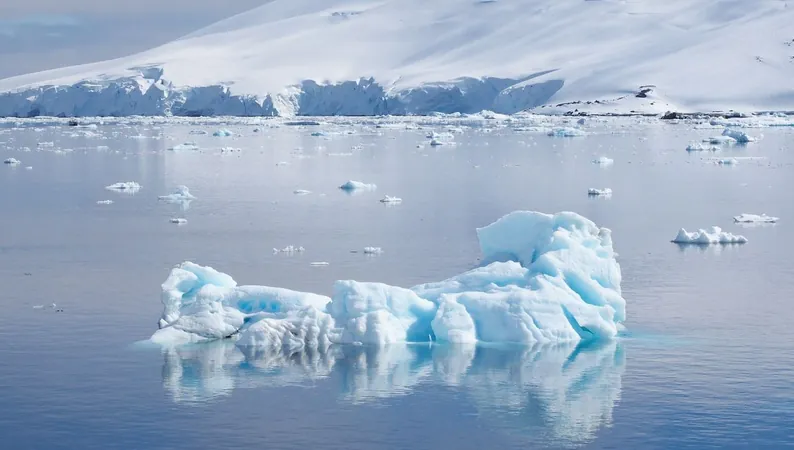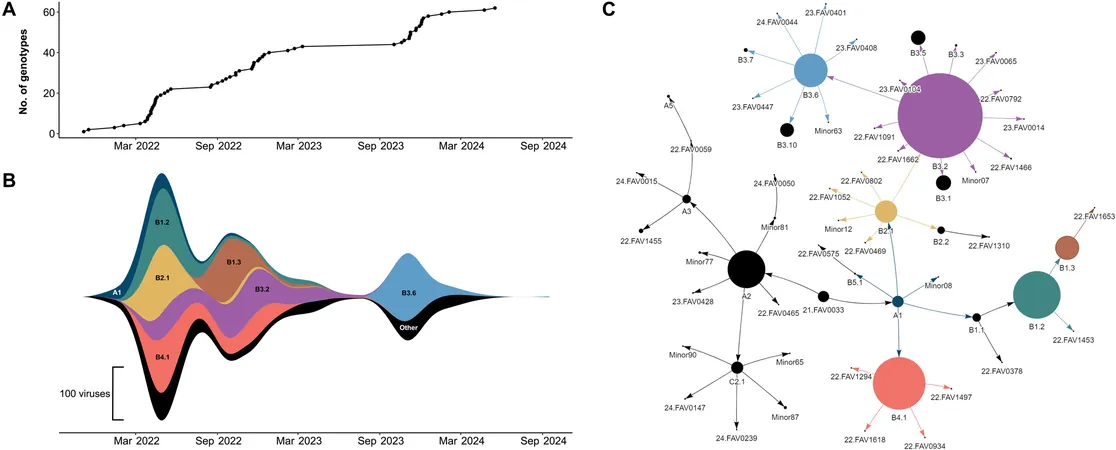
Is Antarctica's Ice Sheet Melting Faster Than We Think? A Shocking New Study Reveals!
2024-12-12
Author: Rajesh
A revolutionary new study suggests that the Antarctic ice sheet may be more unstable than scientists previously believed, with alarming implications for the future of our planet. This groundbreaking research, which examined climate records dating back over 20 million years, reveals that the ice sheet experiences unpredictable "heartbeat-like" cycles of melting and growth.
Historically, the Antarctic ice sheet has not remained constant. Instead, it has undergone significant fluctuations in size, similar to a heartbeat's rhythm. However, these rhythms show surprising variations across different ocean regions, raising questions about naturally occurring patterns in the Earth's climate history. Researchers found these discrepancies puzzling, as they would expect similar signals in the climate record, just as we would not expect a pulse in our leg to differ from the pulse in our arm.
What causes this irregular heartbeat? The study highlights the influence of Earth's eccentric orbit around the Sun, which changes over hundreds of thousands of years. This variation affects the amount of solar energy the Earth receives, leading to cycles of increased melting during warmer periods and stability when the orbit is more circular.
The researchers focused on a warmer period between 28 and 20 million years ago, when the Antarctic ice sheet was the planet's only ice cover. By examining geological cores gathered from the northwest Atlantic Ocean, they analyzed microorganisms trapped in these layers. These tiny fossilized shells provide vital evidence of past environmental conditions, allowing researchers to determine the melting and growth cycles of the ice sheet through the chemistry of oxygen isotopes.
"This approach might seem surprising, but it allows us to capture the Antarctic ice sheet's pulse over tens of millions of years. We're literally time traveling through Earth's history to glean insights into future challenges," explained Professor Paul Wilson, the project’s lead researcher from the University of Southampton.
The implications of these findings are significant. The study indicates that the Antarctic ice sheet is more vulnerable to changes than scientists previously recognized. According to Dr. Tim van Peer from the University of Leicester, past climate events rapidly triggered major melting phases, which differed markedly from the speed at which we anticipate changes due to modern climate dynamics.
As carbon emissions continue to soar, the study warns that we are on a perilous path towards the potential collapse of substantial portions of the Antarctic ice sheet. "Future impacts could be devastating if we don't take immediate action to reduce our carbon footprint," Dr. van Peer cautioned.
The knowledge garnered from this research is critical for scientists as they refine climate models designed to predict future ice sheet behaviors, ultimately helping us understand the consequences of rising sea levels associated with a warming planet. As the world continues to grapple with climate change, this study underscores the urgent need for global strategies to mitigate emissions and preserve vital ice reserves.
Prepare to rethink what you thought you knew about Antarctica's icy fortress—the clock is ticking, and the consequences could be catastrophic!


 Brasil (PT)
Brasil (PT)
 Canada (EN)
Canada (EN)
 Chile (ES)
Chile (ES)
 Česko (CS)
Česko (CS)
 대한민국 (KO)
대한민국 (KO)
 España (ES)
España (ES)
 France (FR)
France (FR)
 Hong Kong (EN)
Hong Kong (EN)
 Italia (IT)
Italia (IT)
 日本 (JA)
日本 (JA)
 Magyarország (HU)
Magyarország (HU)
 Norge (NO)
Norge (NO)
 Polska (PL)
Polska (PL)
 Schweiz (DE)
Schweiz (DE)
 Singapore (EN)
Singapore (EN)
 Sverige (SV)
Sverige (SV)
 Suomi (FI)
Suomi (FI)
 Türkiye (TR)
Türkiye (TR)
 الإمارات العربية المتحدة (AR)
الإمارات العربية المتحدة (AR)